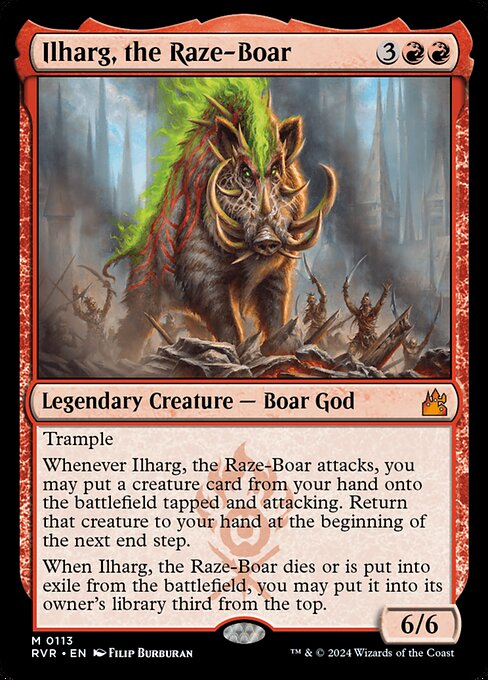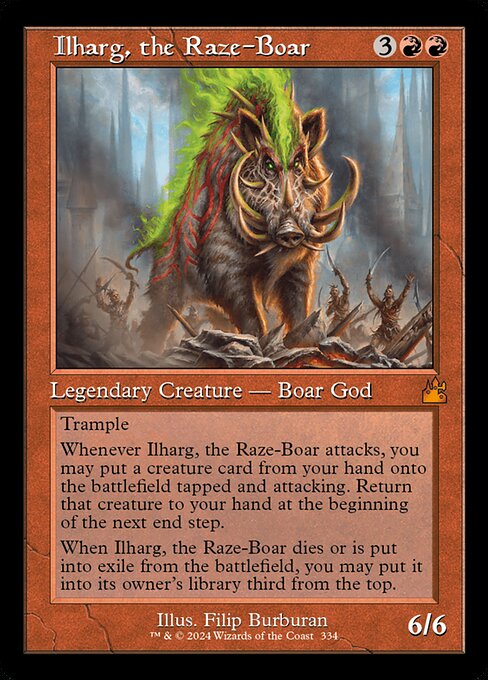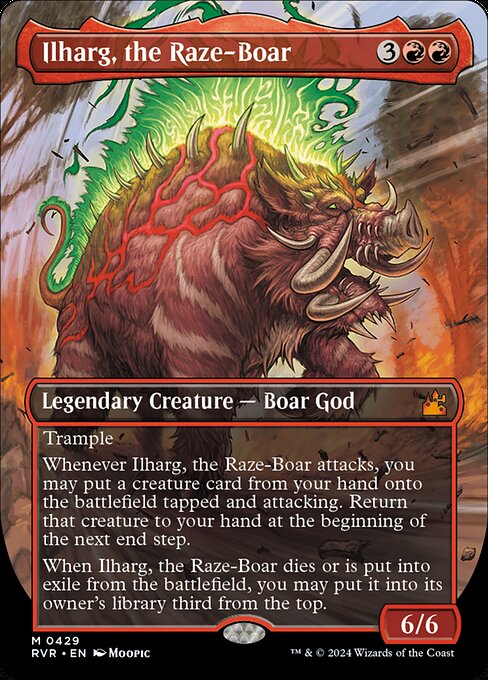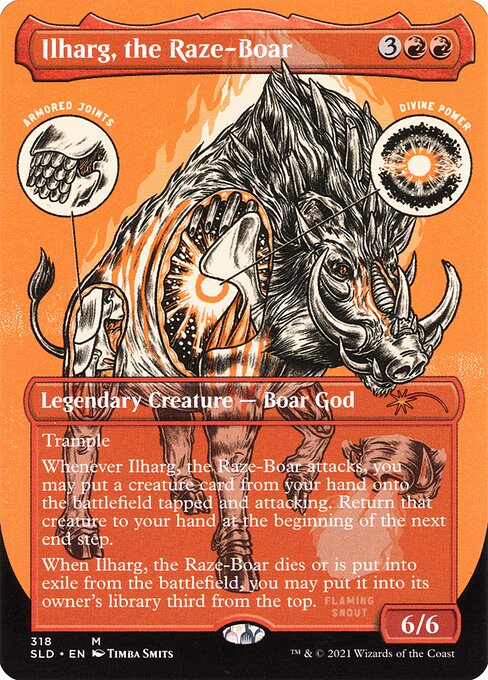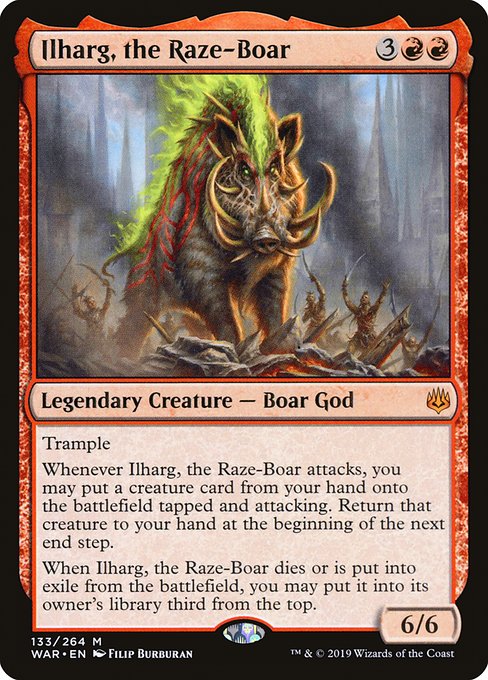Ilharg, le Sanglier terrasseur
Créature légendaire : sanglier et dieu
Piétinement
À chaque fois qu'Ilharg, le Sanglier terrasseur attaque, vous pouvez mettre sur le champ de bataille une carte de créature, engagée et attaquante, depuis votre main. Renvoyez cette créature dans votre main au début de la prochaine étape de fin.
Quand Ilharg, le Sanglier terrasseur meurt ou est mis en exil depuis le champ de bataille, vous pouvez le mettre dans la bibliothèque de son propriétaire en troisième position à partir du dessus.
À chaque fois qu'Ilharg, le Sanglier terrasseur attaque, vous pouvez mettre sur le champ de bataille une carte de créature, engagée et attaquante, depuis votre main. Renvoyez cette créature dans votre main au début de la prochaine étape de fin.
Quand Ilharg, le Sanglier terrasseur meurt ou est mis en exil depuis le champ de bataille, vous pouvez le mettre dans la bibliothèque de son propriétaire en troisième position à partir du dessus.
6/6
standard
future
historic
gladiator
pioneer
explorer
modern
legacy
pauper
vintage
penny
commander
brawl
alchemy
paupercommander
duel
oldschool
premodern
Rulings
Although the new creature is attacking, it was never declared as an attacking creature (for the purposes of abilities that trigger whenever a creature attacks, for example, such as those of Trusted Pegasus and Makeshift Battalion).
If the new creature has an ability that triggers at the beginning of the end step, that ability will trigger and resolve even if the creature is returned to your hand during the end step before that ability resolves.
If the new creature leaves the battlefield before the end step, most likely because it died in combat, that card remains in its current zone. It won’t return to your hand.
If the God’s owner has two or fewer cards in their library, the God is put on the bottom of their library as its last ability resolves.
If one of these Gods would die and it’s your commander in the Commander variant, you may put it into the command zone instead. If you save your commander this way, it doesn’t die and you won’t put it into your library. The same is true if it would be exiled.
If you control another player’s God when it dies, you decide whether to put that card into its owner’s library.
In a multiplayer game, if you put another player’s God onto the battlefield under your control, it will be exiled as you leave the game. If you were still the controller of that God, you would control its triggered ability but you have left the game; that ability won’t resolve and the card remains in exile. Similarly, if you lose the game at the same time that another player’s God that you put onto the battlefield is destroyed, it remains in its owner’s graveyard.
If an effect exiles the God and immediately returns it to the battlefield, its last ability triggers but will have no effect. However, if an effect exiles it and would return it to the battlefield at a later time, the God’s ability may return that card its owner’s library first. If it does, the effect that exiled it won’t return it later.
If one of these Gods leaves the graveyard or exile while its last ability is on the stack, it will remain in its new zone, even if that zone is a graveyard or exile.
You choose which player or planeswalker the new creature is attacking. It doesn’t have to be attacking the same player or planeswalker that Ilharg is attacking.
If the new creature has an ability that triggers at the beginning of the end step, that ability will trigger and resolve even if the creature is returned to your hand during the end step before that ability resolves.
If the new creature leaves the battlefield before the end step, most likely because it died in combat, that card remains in its current zone. It won’t return to your hand.
If the God’s owner has two or fewer cards in their library, the God is put on the bottom of their library as its last ability resolves.
If one of these Gods would die and it’s your commander in the Commander variant, you may put it into the command zone instead. If you save your commander this way, it doesn’t die and you won’t put it into your library. The same is true if it would be exiled.
If you control another player’s God when it dies, you decide whether to put that card into its owner’s library.
In a multiplayer game, if you put another player’s God onto the battlefield under your control, it will be exiled as you leave the game. If you were still the controller of that God, you would control its triggered ability but you have left the game; that ability won’t resolve and the card remains in exile. Similarly, if you lose the game at the same time that another player’s God that you put onto the battlefield is destroyed, it remains in its owner’s graveyard.
If an effect exiles the God and immediately returns it to the battlefield, its last ability triggers but will have no effect. However, if an effect exiles it and would return it to the battlefield at a later time, the God’s ability may return that card its owner’s library first. If it does, the effect that exiled it won’t return it later.
If one of these Gods leaves the graveyard or exile while its last ability is on the stack, it will remain in its new zone, even if that zone is a graveyard or exile.
You choose which player or planeswalker the new creature is attacking. It doesn’t have to be attacking the same player or planeswalker that Ilharg is attacking.
Rulings
Although the new creature is attacking, it was never declared as an attacking creature (for the purposes of abilities that trigger whenever a creature attacks, for example, such as those of Trusted Pegasus and Makeshift Battalion).
If the new creature has an ability that triggers at the beginning of the end step, that ability will trigger and resolve even if the creature is returned to your hand during the end step before that ability resolves.
If the new creature leaves the battlefield before the end step, most likely because it died in combat, that card remains in its current zone. It won’t return to your hand.
If the God’s owner has two or fewer cards in their library, the God is put on the bottom of their library as its last ability resolves.
If one of these Gods would die and it’s your commander in the Commander variant, you may put it into the command zone instead. If you save your commander this way, it doesn’t die and you won’t put it into your library. The same is true if it would be exiled.
If you control another player’s God when it dies, you decide whether to put that card into its owner’s library.
In a multiplayer game, if you put another player’s God onto the battlefield under your control, it will be exiled as you leave the game. If you were still the controller of that God, you would control its triggered ability but you have left the game; that ability won’t resolve and the card remains in exile. Similarly, if you lose the game at the same time that another player’s God that you put onto the battlefield is destroyed, it remains in its owner’s graveyard.
If an effect exiles the God and immediately returns it to the battlefield, its last ability triggers but will have no effect. However, if an effect exiles it and would return it to the battlefield at a later time, the God’s ability may return that card its owner’s library first. If it does, the effect that exiled it won’t return it later.
If one of these Gods leaves the graveyard or exile while its last ability is on the stack, it will remain in its new zone, even if that zone is a graveyard or exile.
You choose which player or planeswalker the new creature is attacking. It doesn’t have to be attacking the same player or planeswalker that Ilharg is attacking.
If the new creature has an ability that triggers at the beginning of the end step, that ability will trigger and resolve even if the creature is returned to your hand during the end step before that ability resolves.
If the new creature leaves the battlefield before the end step, most likely because it died in combat, that card remains in its current zone. It won’t return to your hand.
If the God’s owner has two or fewer cards in their library, the God is put on the bottom of their library as its last ability resolves.
If one of these Gods would die and it’s your commander in the Commander variant, you may put it into the command zone instead. If you save your commander this way, it doesn’t die and you won’t put it into your library. The same is true if it would be exiled.
If you control another player’s God when it dies, you decide whether to put that card into its owner’s library.
In a multiplayer game, if you put another player’s God onto the battlefield under your control, it will be exiled as you leave the game. If you were still the controller of that God, you would control its triggered ability but you have left the game; that ability won’t resolve and the card remains in exile. Similarly, if you lose the game at the same time that another player’s God that you put onto the battlefield is destroyed, it remains in its owner’s graveyard.
If an effect exiles the God and immediately returns it to the battlefield, its last ability triggers but will have no effect. However, if an effect exiles it and would return it to the battlefield at a later time, the God’s ability may return that card its owner’s library first. If it does, the effect that exiled it won’t return it later.
If one of these Gods leaves the graveyard or exile while its last ability is on the stack, it will remain in its new zone, even if that zone is a graveyard or exile.
You choose which player or planeswalker the new creature is attacking. It doesn’t have to be attacking the same player or planeswalker that Ilharg is attacking.
Votre collection ? vos decks ?
Envie de gérer votre collection et/ou créer des decks ?
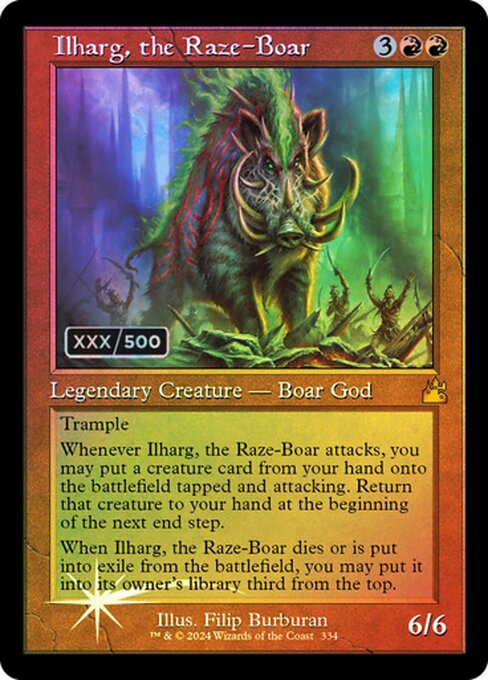

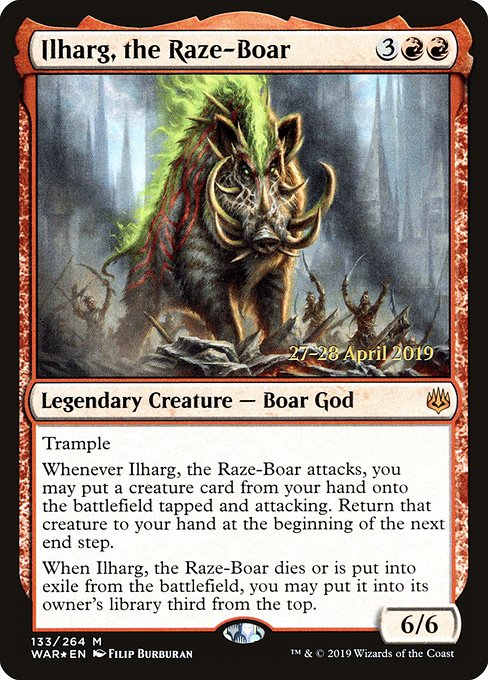
 0
0
 8.30€
8.30€
